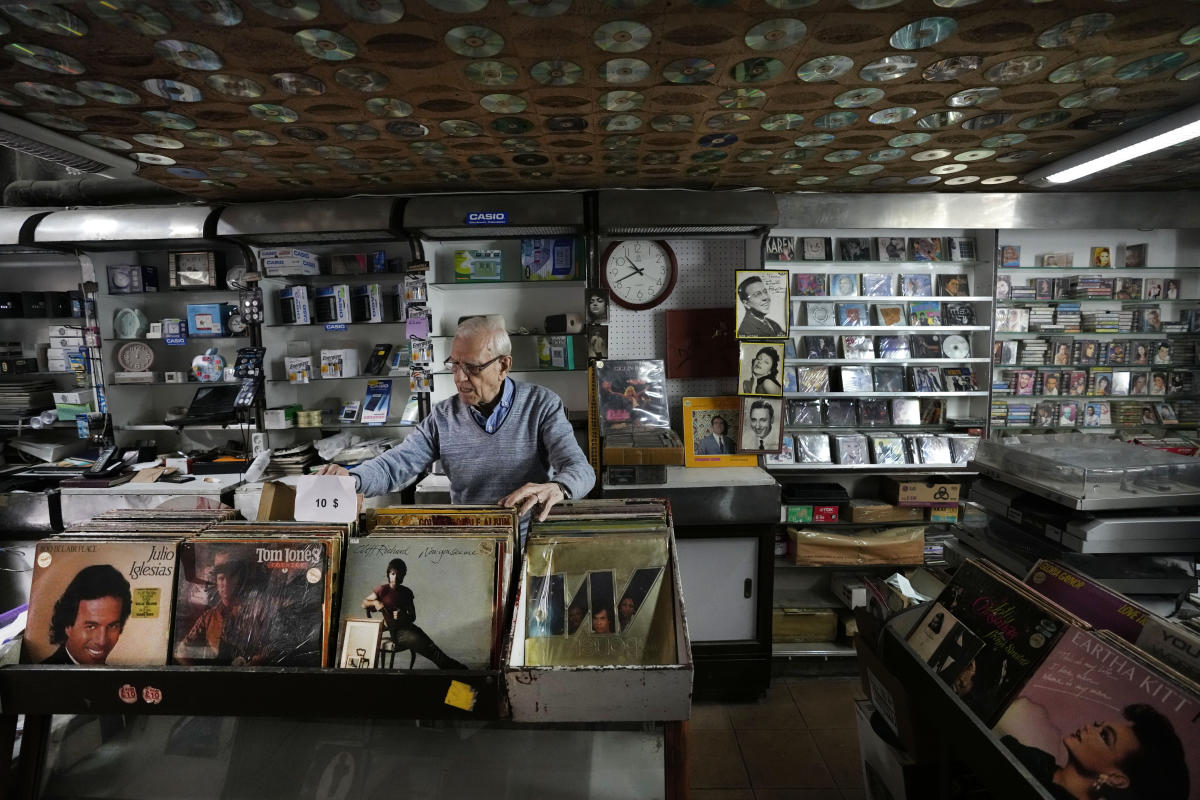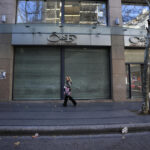
BEIRUT (AP) — From his small music shop on Beirut’s Hamra Street, Michel Eid witnessed the rise and fall of Lebanon through the changing fortunes of this famed boulevard for more than 60 years.
Hamra Street was the center of Beirut’s glamor in the 1960s and 1970s, home to Lebanon’s top movie houses and theaters, cafes frequented by intellectuals and artists, and shops selling top international brands. It saw a revival the past decade, thriving with international chain stores and vibrant bars and restaurants.
Now many of its stores are shuttered. Poverty-stricken Lebanese and Syrian refugees beg on its sidewalks. Trash piles up on its corners. Like the rest of Lebanon, the economic crash swept through the street like a destructive storm.
At 88 years old, Eid remembers the bad times, during Lebanon’s 1975-1990 civil war, when Hamra saw militias battling, assassinations at its cafes and, at one point, invading Israeli troops marching down the street. Nothing was as bad as now, Eid says.
“We have hit rock bottom,” he said. Few customers come to his Tosca Music Shop and Electronic Supplies, which sells records and a variety of electronic clocks, calculators and watches. His business has dropped 75%.
Lebanon’s economic meltdown, which began in October 2019, was the culmination of the country’s post-war era. The war’s militia leaders became the political leadership and have kept a lock on power ever since. They ran an economy that at times boomed but was effectively a Ponzi scheme riddled with corruption and mismanagement.
The scheme finally collapsed in what the World Bank calls one of the world’s worst economic and financial crises since the mid 1800s.
The currency’s value evaporated, salaries lost their buying power, dollars in banks became inaccessible, prices skyrocketed in a country where nearly everything is imported. As much as 82% of the population now lives in poverty, according to the U.N. Unemployment is estimated at 40%.
The crisis was made worse by the coronavirus pandemic and a massive explosion at Beirut’s port that killed 216 people, wounded thousands and destroyed parts of the capital.
While the economic system collapsed, the political one hasn’t. The same leadership, entrenched in power, has done virtually nothing to address the crisis. Refusing basic reforms, they have made no progress in talks with the International Monetary Fund.
A walk through Hamra Street shows the impact.
Many shops have shut down because owners could no longer afford high rents and huge monthly bills for private electricity generators. After nightfall, the shops that are still operating close early. Many streetlights don’t work because of electricity cuts. Hamra, which used to stay lively into the night, feels deserted before midnight — even during the recent holiday season.
In Hamra’s heyday, in the 1960s and 1970s, the street was lit up with colored lights during Christmas and New Year’s, with Santa Clauses up and down the avenue offering candies to passers-by.
This was Lebanon’s cosmopolitan pre-war era — and Hamra Street was its elegant heart, Beirut’s Champs Elysees. Arab, European and American tourists flocked to its swanky shops, restaurants and bars.
Hamra had the capital’s finest movie houses. At its Piccadilly Theater, Lebanon’s most beloved singer Fayrouz performed. You might see the international diva Dalida strolling down the avenue before one of her shows at the Piccadilly. World stars held concerts in Lebanon, including Louis Armstrong and Paul Anka.
Located in the capital’s western neighborhood of Ras Beirut, Hamra was — and still is — a place where Christians and Muslims live side by side. Its cafes were hangouts for artists, intellectuals and political activists, caught up in the leftist, secular Arab nationalist spirit of the times.
“Hamra Street is an international avenue,” says Mohamad Rayes, who has worked on the street since the early ’70s and owns three clothes and lingerie shops in the area.
He spoke sitting in a café that, in the 1970s, was called the Horse Shoe. He pointed to a corner where two of the greatest Arab singers of the time, Abdel-Halim Hafez and Farid el-Atrash, had a regular seat, along with Nizar Qabbani, an iconic romantic poet from Syria.
“It was dizzying, quite honestly, the number of people on Hamra. It was a vibrant, transient piece of life in the city,” said David Livingston, an American who lived for decades in Lebanon, speaking from Cedar Rapids, Iowa. A student in Beirut in the 1970s, he remembered how intimidated he was coming into ritzy Hamra Street to buy a leather belt from one of its shops.
The civil war ended that golden era. In 1982, invading Israeli troops marched through Hamra. After they left, militias seized the area in fighting that wreaked heavy damage. Hamra’s Commodore Hotel became a popular base for foreign journalists covering the war.
After the war, the center of Beirut’s international commerce and shopping moved to a newly renovated downtown. But Hamra Street saw a major facelift in the early 2000s when new water, sewage and electricity systems were installed, and the asphalt was replaced with cobblestones.
That fueled a revival the past 15 years. International chains like Starbucks and Nike opened stores. New restaurants flourished. Syrians fleeing their country’s civil war opened restaurants of their own, along with sweets shops and popular shawarma stands.
The new wave pushed aside many of the Hamra area’s pre-war icons. Its famed cafe Modca was replaced by a bank. A McDonald’s stands in place of Faisal Restaurant, where Arab leftists once huddled over cigarettes, glasses of arak liquor and dishes of appetizers. The Piccadilly Theater was abandoned and recently was damaged by a fire.
But the street attracted a new generation of young people of all sects, bringing the progressive spirit of 2011’s frustrated Arab Spring. Once again, the street rang with bars. One club, Metro Medina, drew young crowds with retro live shows of old Arabic music from the past century.
Hamra remains a busy thoroughfare during the day. Thousands come for treatment at its medical centers or to study at the nearby American University of Beirut, one of the Middle East’s top educational institutions.
But “Hamra is not the Hamra of the past,” said Elie Rbeiz.
The 70-year-old Rbeiz has been a hairdresser for the elite in Hamra since 1962. He counted among his regular clients the late Saudi businessman Adnan Khashoggi, who once flew Rbeiz to London on a private jet for a cut. Rbeiz expanded his business 20 years ago to include men’s clothes.
Now in the economic crisis, his sales have plunged.
Still, Rbeiz believes Hamra will bounce back. He said his shop was blown up during the civil war and he renovated and reopened. “I did not surrender then and will not surrender now. Never.”
Not everyone is so certain.
“I feel the pain every day because there is more suffering and more poverty,” said Naim Saleh.
Saleh is a Hamra Street fixture, selling newspapers, magazines and books at his sidewalk kiosk for the past 52 years.
Now his business is ruined. Foreign magazines are a luxury few can afford. He sells a book or two a month, compared to 50 a day in the past. Saleh watched a young beggar chasing Iraqi tourists nearby. “Look how many beggars there are in the streets. It’s like a curse.”
Eid opened his music store in Hamra in 1958. He’ll close it when he stops working, he said. His two sons live abroad; if they don’t want his 4,500 records, many of which are collectors’ items, he’ll donate them to the Lebanese National Higher Conservatory of Music.
Will Hamra Street flourish again? “Never, never. Impossible,” he said. The Gulf tourists who once fueled its commerce won’t come back, they’ll turn to Europe.
But he won’t leave.
“Hamra Street is the oxygen that I breathe,” he said. “I grew up on Hamra Street and will end my life here.”




